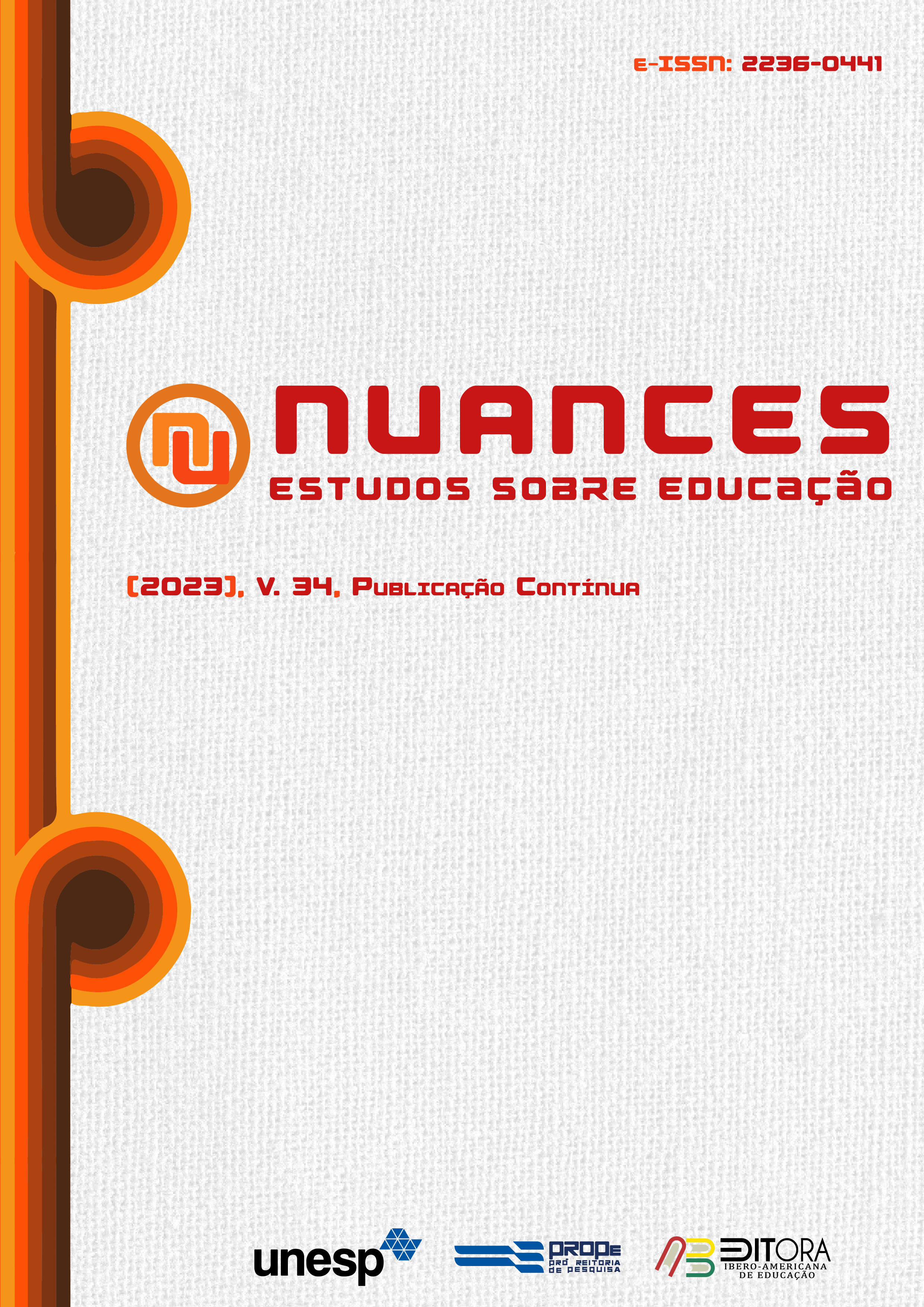Aprendizagem (não-)significativa em tempos de pandemia sob a ótica da justiça social
A dicotomia entre ensinar e ensinar apenas por ensinar
DOI:
https://doi.org/10.32930/nuances.v34i00.9531Palavras-chave:
Educação igualitária, Oportunidades educacionais, Justiça social, Acesso à educação, Ensino remoto, COVID-19Resumo
O surto de COVID-19 e a emergência de saúde pública mundial desencadeada por seu surgimento perturbaram gravemente a ordem global, acarretando enormes desafios sanitários, econômicos e sociais. Em resposta a essa pandemia, resumimos um conjunto abrangente de dados para analisar a recente situação relacionada à educação e as implicações para a desigualdade no acesso à educação de qualidade e condições básicas de estudo, como obstáculos ao pleno acesso às Tecnologias de Informação e Comunicação por alunos de diferentes níveis socioeconômicos. Fatores psicossociais, socioeconômicos e de saúde mental devem ser considerados em conjunto na concepção e implementação de qualquer tipo de intervenção educativa ou metodologia de ensino e de aprendizagem, especialmente em situações emergenciais. Compreender, sob a ótica da justiça social, as faces antagônicas do ensino e suas implicações para a aprendizagem significa responder se estamos, de fato, ensinando (de forma significativa) ou ensinando apenas por ensinar (de forma não significativa).
Downloads
Referências
AUSUBEL, D. P. The Acquisition and Retention of Knowledge: A Cognitive View. 1. ed. Dordrecht: Springer Netherlands, 2000. DOI: 10.1007/978-94-015-9454-7. Disponível em: http://link.springer.com/10.1007/978-94-015-9454-7. Acesso em: 10 jan. 2023.
BHATTACHARYA, U. “I Am a Parrot”: Literacy Ideologies and Rote Learning. Journal of Literacy Research, v. 54, n. 2, p. 113-136, 2022. DOI: 10.1177/1086296X221098065. Disponível em: http://journals.sagepub.com/doi/10.1177/1086296X221098065. Acesso em: 10 jan. 2023.
BROOKS, S. K. et al. The psychological impact of quarantine and how to reduce it: rapid review of the evidence. The Lancet, v. 395, n. 10227, p. 912–920, 2020. DOI: 10.1016/S0140-6736(20)30460-8. Disponível em: https://linkinghub.elsevier.com/retrieve/pii/S0140673620304608. Acesso em: 10 jan. 2023.
CUCCO, B.; GAVOSTO, A.; ROMANO, B. How to Fight Against Drop Out and Demotivation in Crisis Context: Some Insights and Examples from Italy. In: Radical Solutions for Education in a Crisis Context. Singapore: Springer, 2021. p. 23-36. DOI: 10.1007/978-981-15-7869-4_2. Disponível em: http://link.springer.com/10.1007/978-981-15-7869-4_2. Acesso em: 10 jan. 2023.
DLAMINI, R.; MBATHA, K. The discourse on ICT teacher professional development needs: The case of a South African teachers’ union. International Journal of Education and Development using Information and Communication Technology (IJEDICT), v. 14, n. 2, p. 17–37, 2018. Disponível em: http://ijedict.dec.uwi.edu/include/getdoc.php?id=7697&article=2431&mode=pdf. Acesso em: 10 jan. 2023.
EUROSURVEILLANCE. Note from the editors: World Health Organization declares novel coronavirus (2019-nCoV) sixth public health emergency of international concern. Eurosurveillance, v. 25, n. 5, 2020. DOI: 10.2807/1560-7917.ES.2020.25.5.200131e. Disponível em: https://www.eurosurveillance.org/content/10.2807/1560-7917.ES.2020.25.5.200131e. Acesso em: 10 jan. 2023.
FREIRE, P. Pedagogy of Freedom: Ethics, Democracy, and Civic Courage. Lanham, MD: Rowman & Littlefield Publishers, 2000a.
FREIRE, P. Pedagogia da indignação: cartas pedagógicas e outros escritos. São Paulo: Editora UNESP, 2000b.
FREIRE, P.; MACEDO, D.; ARAÚJO FREIRE, A. M. Teachers as Cultural Workers. Expanded ed. Boulder, CO: Westview Press, 2005.
GASPARIN, J. L. Comênio ou da arte de ensinar tudo a todos. 1. ed. São Paulo: Papirus, 1994.
GHERBI, M. ICT and the reality in Algeria. In: INTERNATIONAL ACADEMIC CONFERENCE ON EDUCATION, TEACHING AND E-LEARNING, (IAC-ETEL 2015) 2015, Prague. Anais [...]. Prague: [s. n.], 2015.
HARASIM, L. Learning Theory and Online Technologies. 2. ed. New York, NY: Routledge, 2017. DOI: 10.4324/9781315716831. Disponível em: https://www.taylorfrancis.com/books/9781317508182. Acesso em: 10 jan. 2023.
HAYDT, R. C. C. Curso de didática Geral. 1. ed. São Paulo: Ática, 2011.
HODGES, C. et al. The Difference Between Emergency Remote Teachingand Online Learning. 2020. Disponível em: https://er.educause.edu/articles/2020/3/the-difference-between-emergency-remote-teaching-and-online-learning. Acesso em: 10 jan. 2023.
KAWOHL, W.; NORDT, C. COVID-19, unemployment, and suicide. The Lancet Psychiatry, v. 7, n. 5, p. 389–390, 2020. DOI: 10.1016/S2215-0366(20)30141-3. Disponível em: https://linkinghub.elsevier.com/retrieve/pii/S2215036620301413. Acesso em: 10 jan. 2023.
LIBÂNEO, J. C. Pedagogia e pedagogos: inquietações e buscas. Educar em Revista, n. 17, p. 153–176, 2001. DOI: 10.1590/0104-4060.226. Disponível em: http://www.scielo.br/scielo.php?script=sci_arttext&pid=S0104-40602001000100012&lng=pt&tlng=pt. Acesso em: 10 jan. 2023.
LUCKESI, C. C. Filosofia da Educação. São Paulo: Cortez, 1994.
MAILIZAR, Mailizar; FAN, Lianghuo. Indonesian Teachers’ Knowledge of ICT and the Use of ICT in Secondary Mathematics Teaching. EURASIA Journal of Mathematics, Science and Technology Education, v. 16, n. 1, p. 1–13, 2020. DOI: 10.29333/ejmste/110352. Disponível em: https://www.ejmste.com/article/indonesian-teachers-knowledge-of-ict-and-the-use-of-ict-in-secondary-mathematics-teaching-7763. Acesso em: 10 jan. 2023.
MAYER, R. E. Rote Versus Meaningful Learning. Theory Into Practice, v. 41, n. 4, p. 226–232, 2002. DOI: 10.1207/s15430421tip4104_4. Disponível em: https://www.tandfonline.com/doi/full/10.1207/s15430421tip4104_4. Acesso em: 10 jan. 2023.
MEANS, B.; BAKIA, M.; MURPHY, R. Learning online: what research tells us about whether, when and how. 1. ed. New York, NY: Routledge, 2014.
MUCCI, N. et al. The correlation between stress and economic crisis: a systematic review. Neuropsychiatric Disease and Treatment, v. 12, p. 983–993, 2016. DOI: 10.2147/NDT.S98525. Disponível em: https://www.dovepress.com/the-correlation-between-stress-and-economic-crisis-a-systematic-review-peer-reviewed-article-NDT. Acesso em: 10 jan. 2023.
NORDT, C. et al. Modelling suicide and unemployment: a longitudinal analysis covering 63 countries, 2000–11. The Lancet Psychiatry, v. 2, n. 3, p. 239–245, 2015. DOI: 10.1016/S2215-0366(14)00118-7. Disponível em: https://linkinghub.elsevier.com/retrieve/pii/S2215036614001187. Acesso em: 10 jan. 2023.
OECD. PISA 2018 insights and interpretations. Paris: OECD Publishing, 2019. Disponível em: https://www.oecd.org/pisa/PISA 2018 Insights and Interpretations FINAL PDF.pdf. Acesso em: 10 jan. 2023.
OECD. Education and COVID-19: Focusing on the long-term impact of school closures. Paris: OECD Publishing, 2020a. Disponível em: https://read.oecd-ilibrary.org/view/?ref=135_135187-1piyg9kc7w&title=Education-and-COVID-19-Focusing-on-the-long-term-impact-of-school-closures. Acesso em: 10 jan. 2023.
OECD. A framework to guide an education response to the COVID-19 Pandemic of 2020. Paris: OECD Publishing, 2020b. DOI: 10.1787/6ae21003-en. Disponível em: https://globaled.gse.harvard.edu/files/geii/files/framework_guide_v2.pdf. Acesso em: 10 jan. 2023.
OECD. Access to computers from home (indicator). 2020c. DOI: 10.1787/a70b8a9f-en.
OECD. “Internet access” (indicator). 2020d. DOI: 10.1787/69c2b997-en. Disponível em: https://www.oecd-ilibrary.org/science-and-technology/internet-access/indicator/english_69c2b997-en. Acesso em: 10 jan. 2023.
OECD. Keeping the Internet up and running in times of crisis. Paris: OECD Publishing, 2020e. Disponível em: https://read.oecd-ilibrary.org/view/?ref=130_130768-5vgoglwswy&title=Keeping-the-Internet-up-and-running-in_times-of-crisis. Acesso em: 10 jan. 2023.
OECD. COVID-19: Protecting people and Societies. Paris: OECD Publishing, 2020f.
OPENSIGNAL. The State of Mobile Video. Sept. 2018. Disponível em: https://www.opensignal.com/reports/2018/09/state-of-mobile-video. Acesso em: 10 jan. 2023.
OPENSIGNAL. The state of mobile network experience: Benchmarking mobile on the eve of the 5G revolution. May 2019. Disponível em: https://cdn.opensignal.com/public/data/reports/global/data-2019-05/the_state_of_mobile_experience_may_2019_0.pdf. Acesso em: 10 jan. 2023.
PFEFFERBAUM, B.; NORTH, C. S. Mental Health and the Covid-19 Pandemic. New England Journal of Medicine, v. 383, n. 6, p. 510–512, 2020. DOI: 10.1056/NEJMp2008017. Disponível em: http://www.nejm.org/doi/10.1056/NEJMp2008017. Acesso em: 10 jan. 2023.
RIDEOUT, V.; KATZ, V. S. An opportunity for all? Technology and learning in lower-income families. A report of the Families and Media Project. The Joan Ganz Cooney Center at Sesame Workshop, New York, NY, p. 47, 2016. Disponível em: https://www.joanganzcooneycenter.org/wp-content/uploads/2016/01/jgcc_opportunityforall.pdf. Acesso em: 10 jan. 2023.
ROGERS, C. R. On becoming a person: A therapist’s view of psychotherapy. 3. ed. Boston, MA: Houghton Mifflin Company, 1961.
ROSER, M. et al. Coronavirus Pandemic (COVID-19) - Statistics and Research. 2020. Disponível em: https://ourworldindata.org/covid-school-workplace-closures. Acesso em: 10 jan. 2023.
SANDVINE. The Global Internet Phenomena Report COVID-19 Spotlight. Sandvine, May 2020. Disponível em: https://www.sandvine.com/hubfs/Sandvine_Redesign_2019/Downloads/2020/Phenomena/COVID Internet Phenomena Report 20200507.pdf. Acesso em: 10 jan. 2023.
UNITED NATIONS (UN). Patterns and trends in household size and composition: Evidence from a United Nations dataset. UN, 2019. Disponível em: https://www.un.org/development/desa/pd/sites/www.un.org.development.desa.pd/files/files/documents/2020/Jan/un_2019_household_size_and_composition.pdf. Acesso em: 10 jan. 2023.
UN, United Nations. Policy Brief: Education during COVID-19 and beyond (August 2020). UN, 2020a. Disponível em: https://www.un.org/development/desa/dspd/wp-content/uploads/sites/22/2020/08/sg_policy_brief_covid-19_and_education_august_2020.pdf. Acesso em: 10 jan. 2023.
UNITED NATIONS (UN). World Social Report 2020: INEQUALITY IN A RAPIDLY CHANGING WORLD. UN, 2020b. Disponível em: https://www.un.org/development/desa/dspd/wp-content/uploads/sites/22/2020/02/World-Social-Report2020-FullReport.pdf. Acesso em: 10 jan. 2023.
UNESCO. Distance learning strategies in response to COVID-19 school closures. 2020. Disponível em: https://unesdoc.unesco.org/in/rest/annotationSVC/DownloadWatermarkedAttachment/attach_import_ec75c9cc-b146-4aec-b068-147e3d5a03d7?_=373305eng.pdf&to=8&from=1. Acesso em: 10 jan. 2023.
WORLD HEALTH ORGANIZATION (WHO). Coronavirus (COVID-19) events as they happen. 2020a. Disponível em: https://www.who.int/emergencies/diseases/novel-coronavirus-2019/events-as-they-happen. Acesso em: 30 ago. 2020. Acesso em: 10 jan. 2023
WORLD HEALTH ORGANIZATION (WHO). WHO Director-General’s statement on IHR Emergency Committee on Novel Coronavirus (2019-nCoV). 2020b. Disponível em: https://www.who.int/dg/speeches/detail/who-director-general-s-statement-on-ihr-emergency-committee-on-novel-coronavirus-(2019-ncov). Acesso em: 29 jan. 2020. Acesso em: 10 jan. 2023.
WORLD HEALTH ORGANIZATION (WHO). Timeline of WHO’s response to COVID-19. 2020c. Disponível em: https://www.who.int/emergencies/diseases/novel-coronavirus-2019/interactive-timeline. Acesso em: 29 jul. 2020. Acesso em: 10 jan. 2023.
Downloads
Publicado
Edição
Seção
Licença
Copyright (c) 2023 Nuances: Estudos sobre Educação

Este trabalho está licenciado sob uma licença Creative Commons Attribution-NonCommercial 4.0 International License.
Atribuição-NãoComercial
CC BY-NC
Esta licença permite que outros remixem, adaptem e criem a partir do seu trabalho para fins não comerciais, e embora os novos trabalhos tenham de lhe atribuir o devido crédito e não possam ser usados para fins comerciais, os usuários não têm de licenciar esses trabalhos derivados sob os mesmos termos.





